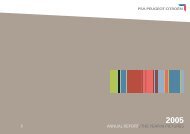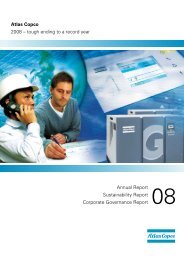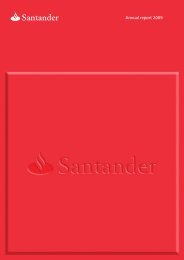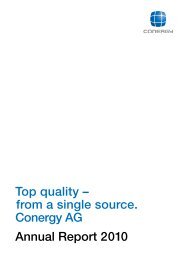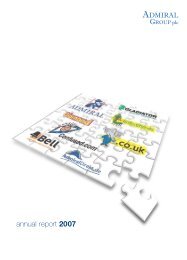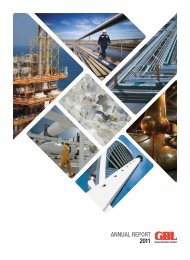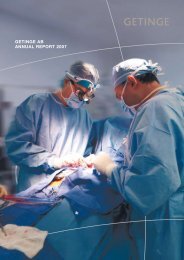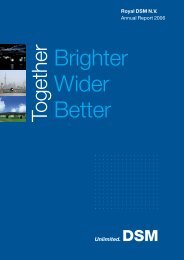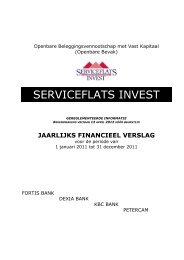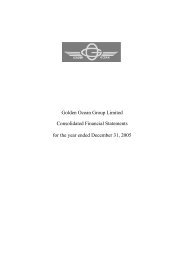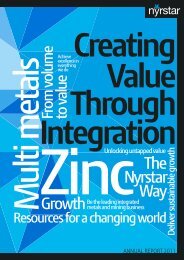BOC Report and accounts 2005 - Alle jaarverslagen
BOC Report and accounts 2005 - Alle jaarverslagen
BOC Report and accounts 2005 - Alle jaarverslagen
You also want an ePaper? Increase the reach of your titles
YUMPU automatically turns print PDFs into web optimized ePapers that Google loves.
Financial review 61<br />
Current asset provisions In the course of normal trading activities, management uses its judgement in establishing<br />
the net realisable value of various elements of working capital – principally stocks, work-in-progress <strong>and</strong> <strong>accounts</strong><br />
receivable. Provisions are established for obsolete or slow moving stocks, bad or doubtful debts <strong>and</strong> product<br />
warranties.Actual costs in future periods may be different from the provisions established <strong>and</strong> any such differences<br />
would affect future earnings of the Group.<br />
The provisions are established at levels appropriate to the circumstances within individual Group business<br />
units, <strong>and</strong> not on a Group-wide systematic basis. It is therefore considered that any estimate of the impact on<br />
annual Group operating profit of any change in such provisions may not be meaningful. Nevertheless, a change of<br />
ten per cent in the level of provision for bad <strong>and</strong> doubtful debts at 30 September <strong>2005</strong> would have an impact of<br />
approximately £3 million on annual Group operating profit.<br />
The areas covered by critical accounting policies under UK GAAP do not materially differ from those<br />
under US GAAP. Further details of the differences between UK <strong>and</strong> US GAAP are given in note 30 to the<br />
financial statements.<br />
Accounting<br />
The Group’s accounting policies are based on accounting principles generally accepted in the UK (UK GAAP).<br />
During the year, the following new UK st<strong>and</strong>ards were issued:<br />
FRS22 – Earnings per share<br />
FRS23 – The effects of changes in foreign exchange rates<br />
FRS24 – Financial reporting in hyperinflationary economies<br />
FRS25 – Financial instruments: Disclosure <strong>and</strong> presentation<br />
FRS26 – Financial instruments: Measurement<br />
FRS27 – Life assurance<br />
FRS28 – Corresponding amounts<br />
RS1– Operating <strong>and</strong> financial review<br />
None of these st<strong>and</strong>ards are effective for the Group for the financial year ended 30 September <strong>2005</strong>.The <strong>accounts</strong><br />
for the financial year ended 30 September <strong>2005</strong> have therefore been prepared on an accounting basis consistent<br />
with that applied in the financial year ended 30 September 2004.With effect from 1 October <strong>2005</strong> the Group’s<br />
accounting policies will be based on International Financial <strong>Report</strong>ing St<strong>and</strong>ards, as outlined in the following section.<br />
International Financial <strong>Report</strong>ing St<strong>and</strong>ards<br />
In accordance with EU legislation, the Group is required to adopt International Financial <strong>Report</strong>ing St<strong>and</strong>ards<br />
(IFRS) in accounting periods commencing on or after 1 January <strong>2005</strong>.Accordingly, IFRS will first apply to the<br />
Group’s financial statements for the financial year commencing 1 October <strong>2005</strong>. Results for the quarter ending<br />
31 December <strong>2005</strong>, which will be announced in February 2006, will be presented on an IFRS basis. In January 2006<br />
the Group intends to present results for each quarter of the financial year to 30 September <strong>2005</strong> restated<br />
on an IFRS basis.<br />
The Group established an IFRS project team in 2003.This is overseen by a formal steering committee, which<br />
includes the Group finance director.There have been regular reports on progress to the audit committee <strong>and</strong><br />
executive management board.A comprehensive training programme has been undertaken covering Group finance<br />
personnel worldwide.The Group’s auditors have been kept informed of, <strong>and</strong> consulted on, the development of the<br />
IFRS project <strong>and</strong> the preparation <strong>and</strong> implementation of the new Group accounting policies.<br />
The Group is still in the process of finalising the full effects of adopting IFRS but management is confident that<br />
all areas have been identified where significant differences will arise between UK GAAP <strong>and</strong> IFRS.These areas are<br />
set out below.This is based on the IFRS that are expected to be in effect for the year to 30 September 2006.<br />
However, it is possible that there could be further changes to IFRS <strong>and</strong> interpretations prior to this date.The Group<br />
has elected to adopt early the amendment to IAS19 as set out below, but does not currently intend to adopt early<br />
any other IFRS or interpretations.<br />
The principal differences which management expects to affect the Group are as follows:<br />
a) Goodwill. Under UK GAAP, goodwill is amortised over a period up to a maximum of 20 years. Under IFRS,<br />
goodwill is not amortised but instead is reviewed for impairment annually.<br />
b) Share based payments. Under UK GAAP the cost of share options is calculated by reference to their intrinsic<br />
value, which means that there is no charge for options granted at the market price. Under IFRS, the Group will<br />
record a charge for the fair value of all share options including Save As You Earn schemes.<br />
c) Taxation. Preliminary estimates indicate that the tax rate will be slightly higher under IFRS <strong>and</strong> the impact will<br />
be fully quantified as part of the restated results to be announced in January 2006.<br />
d) Pensions.The Group has already adopted FRS 17 under UK GAAP.The equivalent IFRS is IAS 19 <strong>and</strong> the<br />
Group intends to adopt early the amendment to IAS 19 allowing for immediate recognition of actuarial gains<br />
<strong>and</strong> losses in a Statement of Recognised Income <strong>and</strong> Expense.Accordingly, the impact of accounting for<br />
pensions under IFRS will be similar, although not identical, to UK GAAP <strong>and</strong> as a result management does not<br />
expect a significant impact on earnings.There will be a difference in presentation in the balance sheet, <strong>and</strong><br />
differences relating to the calculation of certain assets <strong>and</strong> liabilities. Under UK GAAP, net pension assets or<br />
liabilities are shown after deduction of the appropriate deferred tax. Under IFRS, net pension assets or<br />
liabilities are shown before the deduction of any deferred tax, which is then included with other deferred<br />
tax items.



